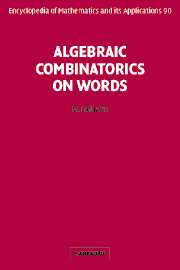Book contents
- Frontmatter
- Contents
- Preface
- Chapter 1 Finite and Infinite Words
- Chapter 2 Sturmian Words
- Chapter 3 Unavoidable Patterns
- Chapter 4 Sesquipowers
- Chapter 5 The Plactic Monoid
- Chapter 6 Codes
- Chapter 7 Numeration Systems
- Chapter 8 Periodicity
- Chapter 9 Centralizers of Noncommutative Series and Polynomials
- Chapter 10 Transformations on Words and q-Calculus
- Chapter 11 Statistics on Permutations and Words
- Chapter 12 Makanin's Algorithm
- Chapter 13 Independent Systems of Equations
- References
- Index of Notation
- General Index
Chapter 9 - Centralizers of Noncommutative Series and Polynomials
Published online by Cambridge University Press: 05 April 2013
- Frontmatter
- Contents
- Preface
- Chapter 1 Finite and Infinite Words
- Chapter 2 Sturmian Words
- Chapter 3 Unavoidable Patterns
- Chapter 4 Sesquipowers
- Chapter 5 The Plactic Monoid
- Chapter 6 Codes
- Chapter 7 Numeration Systems
- Chapter 8 Periodicity
- Chapter 9 Centralizers of Noncommutative Series and Polynomials
- Chapter 10 Transformations on Words and q-Calculus
- Chapter 11 Statistics on Permutations and Words
- Chapter 12 Makanin's Algorithm
- Chapter 13 Independent Systems of Equations
- References
- Index of Notation
- General Index
Summary
Introduction
It is a well-known and not too difficult result of combinatorics on words that if two words commute under the concatenation product, then they are both powers of the same word: they have a common root. This fact is essentially equivalent to the following one: the centralizer of a nonempty word, that is, the set of words commuting with it, is the set of powers of the shortest root of the given word.
The main results of this chapter are an extension of this latter result to noncommutative series and polynomials: Cohn's and Bergman's centralizer theorems. The first asserts that the centralizer of an element of the algebra of noncommutative formal series is isomorphic to an algebra of formal series in one variable. The second is the similar result for non-commutative polynomials. Note that these theorems admit the following consequences: if two noncommutative series (resp. polynomials) commute, then they may both be expressed as a series (resp. a polynomial) in a third one. This formulation stresses the similarity with the result on words given above.
We begin with Cohn's theorem, since it is needed for Bergman's theorem. Its proof requires mainly a divisibility property of noncommutative series. The proof of Bergman's theorem is rather indirect: it uses the noncommutative Euclidean division of Cohn, the difficult result that the centralizer of a noncommutative polynomial is integrally closed in its field of fractions, its embeddability in a one-variable polynomial ring, which uses a pretty argument of combinatorics on words, and finally another result of Cohn characterizing free subalgebras of a one-variable polynomial algebra.
- Type
- Chapter
- Information
- Algebraic Combinatorics on Words , pp. 312 - 329Publisher: Cambridge University PressPrint publication year: 2002



